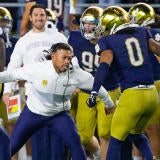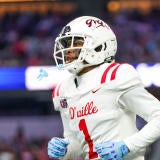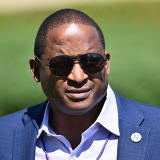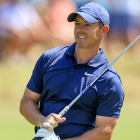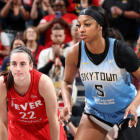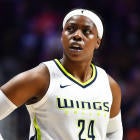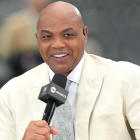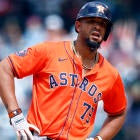CBSSports.com Senior College Football Columnist Dennis Dodd spent the offseason investigating the issue of concussions in college football -- the background on the issue, the competing interests at play in the current debate, and the way forward for the sport. The details of Dodd's reporting will be revealed in a multi-part series throughout the week, with previous installments of the series indexed HERE.
When researching a series like this, there is a lot one has to leave out. Even in cyberspace, space is limited. My editors have told me so.
Here are some of the best quotes and bits of information that didn’t fit over the last three days in my concussion series:
“ … until the end of 2012, there was not a widely accepted consensus among medical experts about the need to keep players out of action on the same day of a concussion.” -- The Chronicle of Higher Education in July, summarizing a conclusion by NCAA chief medical officer Brian Hainline.
“The problem is the experts, when it comes to management of sport-related concussions, have vastly competing [opinions] on what constitutes the proper management of care." -- attorney Steve Pachman, partner in the litigation department of Montgomery McCracken in Philadelphia
“As coaches there is more of an onus on you to be proactive. I know there is enormous pressure to win. I played, I understand. The other side is if you put him [player] back in there too soon … you’re in court. You want to think more long term with the players’ health and safety.” -- fellow Montgomery McCracken attorney Bill Conaty to coaches and administrators at a Fiesta Bowl concussion summit in May
“The macho … ‘Hit ‘em in the mouth, bust ‘em in the head, tear their head off’, that’s got to go away. That doesn’t really sound good in front of a jury. If that’s not being discussed, it will be discussed when it gets inside the courtroom ... The macho culture, the macho swagger, doesn’t sell. It jeopardizes everyone in the program.” -- former coach Gary Darnell to the same audience. Darnell is currently the associate executive director of the American Football Coaches Association.
“I’ve got to ask about alcohol use and the potential, maybe, that’s the reason they were having headaches. They were hung over.” -- Pachman on how he might cross-examine a plaintiff in concussion lawsuit
“I’m surprised that more conferences haven’t followed suit.” -- Robin Harris, executive director of the Ivy League, whose league has limited full-contact practices to twice a week during the season
“If you get in a five-star car you can die … but five-star vehicles reduce your risk as opposed to a one-star vehicle. Same thing with helmets. You can still get a concussion in any helmet but some of them can reduce the risk pretty dramatically.” -- Virginia Tech biomechanical engineering professor Dr. Stefan Duma who has annually rated the safety of football helmets the last four years (Virginia Tech Helmet Ratings)
”We hadn’t intended to rate helmets until about four years ago. We started looking and looking and were surprised there was no data. All people had was the price and what it looked like. It was a huge void.” -- Duma
"Human beings ignore warnings every day -- seat belts, driving after drinking. I like the idea of making players read the [helmet sticker] warning and make them sign a document.” --Pachman
"Our team physician wears a beeper and if there is a high-level hit it beeps.” -- Duma on the cutting-edge research Virginia Tech is doing on the subject of head trauma. Each time a Hokie gets a hit to his head of at least 98 Gs a helmet sensor records it and that beeper goes off. That player is flagged for examination.
“The NCAA. That is the fundamental building block of our whole case … The NCAA was founded back to the Teddy Roosevelt days on player safety. For them now to say it’s not their duty and they have no business, it’s just crazy.” -- attorney Joe Siprut on who is responsible for “duty of care” in protecting college athletes from concussions. Siprut is representing Adrian Arrington (and three others) in their lawsuit against the NCAA alleging negligence in the treatment of concussions.
“Student-athletes, we feel like we don’t have a voice.” -- Arrington
“It’s the right thing to do.” -- national coordinator of officials Rogers Redding on the new rule that calls for an ejection of a player flagged for targeting. (A replay official can overturn the ejection.)
"Eliminate the cheap shot. When a receiver goes after a ball and the defensive back doesn’t play the ball and plays the man, goes for the kill, they should ban that guy for the rest of the season. [The new ejection rule], that’s not enough. Put some teeth in it.” -- former Ohio State and Tulsa coach John Cooper
The impact that’s out on the field nowadays is so much more dramatic than it has ever been. These guys are amazingly strong. There is not any manufacturer that says it has a 100 percent concussion-proof helmet. You’ll notice none of them say that.” -- BYU equipment manager Mick Hill
"In terms of what we know about concussions, it’s amazing how little we know.” --Dr. Dennis Molfese of the University of Nebraska Center for Brain Biology and Behavior
"Guys are just fast and big and strong. It’s a violent game.” -- former Colorado quarterback Joel Klatt who sustained 10 concussions during his playing days from 2002-2005
Concussions and college football
Part 1: Ex-player's case takes aim at NCAA
Q&A: NCAA's chief doctor answers questions
Part 2: Ex-QB Klatt puts onus on NCAA
Part 3: Stiles' death may unravel mystery
Part 4: Will college football change? Yes
Quotable: Notable thoughts on concussions









